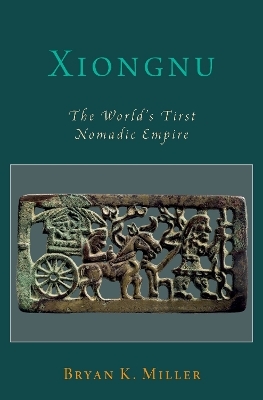
Xiongnu
The World's First Nomadic Empire
Seiten
2024
Oxford University Press Inc (Verlag)
978-0-19-008369-4 (ISBN)
Oxford University Press Inc (Verlag)
978-0-19-008369-4 (ISBN)
This book raises the case of the world's first nomadic empire, the Xiongnu, as a prime example of the sophisticated developments and powerful influence of nomadic regimes. Launching from a reconceptualization of the social and economic institutions of mobile pastoralists, Bryan K. Miller traces the course of the Xiongnu Empire from before its initial rise to after its eventual fall.
This book raises the case of the world's first nomadic empire, the Xiongnu, as a prime example of the sophisticated developments and powerful influence of nomadic regimes. Launching from a reconceptualization of the social and economic institutions of mobile pastoralists, the collective chapters trace the course of the Xiongnu Empire from before its initial rise, traversing the wars that challenged it and the reformations that made it stronger, to the legacy left after its eventual fall.
Xiongnu expounds the economic practices and social conventions of steppe herders as fertile foundations for institutions and infrastructure of empire, and renders a model of “empires of mobilities,” which engaged the control less of towns and territories and more of the movements of communities and capital to fuel their regimes. By weaving together archaeological examinations with historical investigations, Bryan K. Miller presents a more complex and nuanced narrative of how an empire based firmly in the steppe over two thousand years ago managed to formulate a robust political economy and a complex political matrix that capitalized on mobilities and alternative forms of political participation, and allowed the Xiongnu to dominate vast realms of central Eurasia and leave lasting geopolitical effects on the many worlds around them.
This book raises the case of the world's first nomadic empire, the Xiongnu, as a prime example of the sophisticated developments and powerful influence of nomadic regimes. Launching from a reconceptualization of the social and economic institutions of mobile pastoralists, the collective chapters trace the course of the Xiongnu Empire from before its initial rise, traversing the wars that challenged it and the reformations that made it stronger, to the legacy left after its eventual fall.
Xiongnu expounds the economic practices and social conventions of steppe herders as fertile foundations for institutions and infrastructure of empire, and renders a model of “empires of mobilities,” which engaged the control less of towns and territories and more of the movements of communities and capital to fuel their regimes. By weaving together archaeological examinations with historical investigations, Bryan K. Miller presents a more complex and nuanced narrative of how an empire based firmly in the steppe over two thousand years ago managed to formulate a robust political economy and a complex political matrix that capitalized on mobilities and alternative forms of political participation, and allowed the Xiongnu to dominate vast realms of central Eurasia and leave lasting geopolitical effects on the many worlds around them.
Bryan K. Miller is Assistant Professor of Central Asian Art & Archaeology in History of Art and Assistant Curator of Chinese Archaeology at the Museum of Anthropological Archaeology at the University of Michigan.
Prologue
1. Nomad Protagonists
2. Kingdoms of Those Who Draw the Bow
3. Masters of the Steppe
4. Rule by the Horse
5. Of Wolves and Sheep
6. Masters of the Continental Worlds
7. Hunnic Heritage
Epilogue
Notes
Bibliography
Appendix
Index
| Erscheinungsdatum | 28.12.2023 |
|---|---|
| Reihe/Serie | Oxford Studies in Early Empires |
| Zusatzinfo | 47, b/w |
| Verlagsort | New York |
| Sprache | englisch |
| Maße | 163 x 168 mm |
| Gewicht | 703 g |
| Themenwelt | Geisteswissenschaften ► Archäologie |
| Geschichte ► Allgemeine Geschichte ► Vor- und Frühgeschichte | |
| Geisteswissenschaften ► Geschichte ► Regional- / Ländergeschichte | |
| ISBN-10 | 0-19-008369-7 / 0190083697 |
| ISBN-13 | 978-0-19-008369-4 / 9780190083694 |
| Zustand | Neuware |
| Informationen gemäß Produktsicherheitsverordnung (GPSR) | |
| Haben Sie eine Frage zum Produkt? |
Mehr entdecken
aus dem Bereich
aus dem Bereich
Was Pompeji über uns erzählt
Buch | Hardcover (2023)
Propyläen (Verlag)
32,00 €
auf den Spuren der frühen Zivilisationen
Buch | Hardcover (2023)
C.H.Beck (Verlag)
20,00 €


